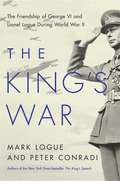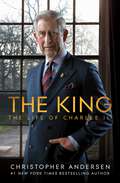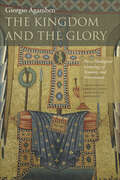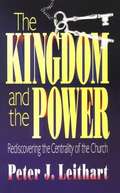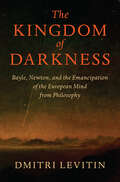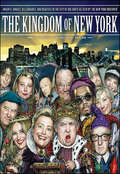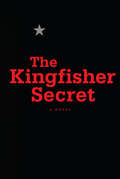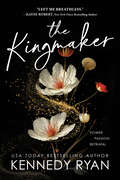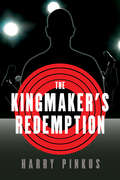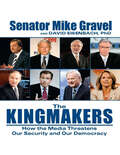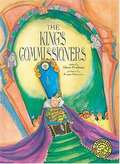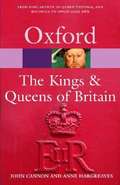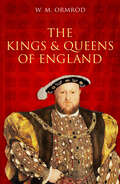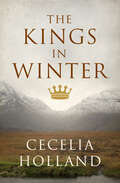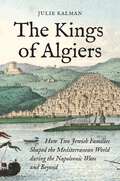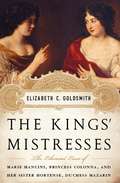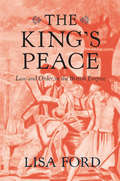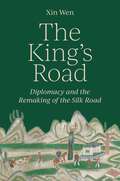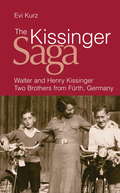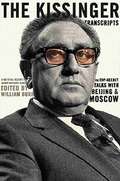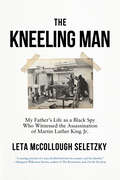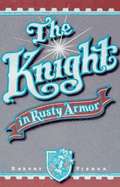- Table View
- List View
The King's War: The Friendship Of George Vi And Lionel Logue During World War Ii
by Mark Logue Peter ConradiFollowing the New York Times bestselling The King's Speech, this eagerly anticipated sequel takes King George VI and his confidant and speech therapist Lionel Logue into the darkest days of World War II. The broadcast that George VI made to the British nation on the outbreak of war in September 1939—which formed the climax of the multi-Oscar-winning film The King's Speech—was the product of years of hard work with Lionel Logue, his iconoclastic, Australian-born speech therapist. Yet the relationship between the two men did not end there. Far from it: in the years that followed, Logue was to play an even more important role at the monarch's side. The King's War follows that relationship through the dangerous days of Dunkirk and the drama of D-Day to eventual victory in 1945—and beyond. Like the first book, it is written by Peter Conradi, a London Sunday Times journalist, and Mark Logue (Lionel's grandson), and again draws on exclusive material from the Logue Archive—the collection of diaries, letters, and other documents left by Lionel and his feisty wife, Myrtle. This gripping narrative provides a fascinating portrait of two men and their respective families—the Windsors and the Logues—as they together face the greatest challenge in Britain's history.
The King, the Princess, and the Tinker
by Ellen Kindt MckenzieA wise tinker, and a young princess try to convince a greedy King that there are more important things than his riches.
The King: The Life of Charles III
by Christopher AndersenFrom #1 New York Times bestselling author Christopher Andersen comes a vivid and unsparing yet sympathetic portrait of one of the most complex and enigmatic figures of our time: Charles, who has taken his place on the throne after being the oldest and longest-serving heir in British history. Since the day Charles Philip Arthur George was born, he has been groomed to be King. After more than seventy years of waiting, he finally ascends the throne. The King examines the private life of this historically important and controversial figure, set against the grand, thousand-year sweep of the British monarchy. This richly detailed biography covers it all, from his military training to his marriage to Lady Diana, through their separation and her tragic death to his marriage to Camilla Parker Bowles. In the process, it provides a balanced but fully honest look into the life of the new monarch. This book will tell you what the King—a man who has remained something of an enigma, shrouded in speculation and intrigue—is really like. The King is the first biography of Charles since he has become monarch and serves as an authoritative chronicle of his life.
The Kingdom and The Glory: For a Theological Genealogy of Economy and Government (Meridian: Crossing Aesthetics)
by Giorgio AgambenWhy has power in the West assumed the form of an "economy," that is, of a government of men and things? If power is essentially government, why does it need glory, that is, the ceremonial and liturgical apparatus that has always accompanied it? In the early centuries of the Church, in order to reconcile monotheism with God's threefold nature, the doctrine of Trinity was introduced in the guise of an economy of divine life. It was as if the Trinity amounted to nothing more than a problem of managing and governing the heavenly house and the world. Agamben shows that, when combined with the idea of providence, this theological-economic paradigm unexpectedly lies at the origin of many of the most important categories of modern politics, from the democratic theory of the division of powers to the strategic doctrine of collateral damage, from the invisible hand of Smith's liberalism to ideas of order and security. But the greatest novelty to emerge fromThe Kingdom and the Gloryis that modern power is not only government but also glory, and that the ceremonial, liturgical, and acclamatory aspects that we have regarded as vestiges of the past actually constitute the basis of Western power. Through a fascinating analysis of liturgical acclamations and ceremonial symbols of power-the throne, the crown, purple cloth, the Fasces, and more-Agamben develops an original genealogy that illuminates the startling function of consent and of the media in modern democracies. With this book, the work begun withHomo Sacerreaches a decisive point, profoundly challenging and renewing our vision of politics.
The Kingdom and the Power: Rediscovering the Centrality of the Church
by Peter J. LeithartTo some extent, our perception of the church's present task depends largely on our perception of the current state of our civilization.If American Christians are victims of a vicious elite, working to regain the levers of power might seem a sensible strategy. If, however, American culture is a mess because the church is a mess, then the most sensible strategy would be to begin with the reform of the church. The World is trying to experiment with attempting to form a civilized but non-Christian mentality.
The Kingdom of Darkness: Bayle, Newton, and the Emancipation of the European Mind from Philosophy
by Dmitri LevitinIn 1500, speculative philosophy lay at the heart of European intellectual life; by 1700, its role was drastically diminished. The Kingdom of Darkness tells the story of this momentous transformation. Dmitri Levitin explores the structural factors behind this change: the emancipation of natural philosophy from metaphysics; theologians' growing preference for philology over philosophy; and a new conception of the limits of the human mind derived from historical and oriental scholarship, not least concerning China and Japan. In turn, he shows that the ideas of two of Europe's most famous thinkers, Pierre Bayle and Isaac Newton, were both the products of this transformation and catalysts for its success. Drawing on hundreds of sources in many languages, Levitin traces in unprecedented detail Bayle and Newton's conceptions of what Thomas Hobbes called The Kingdom of Darkness: a genealogical vision of how philosophy had corrupted the human mind. Both men sought to remedy this corruption, and their ideas helped lay the foundation for the system of knowledge that emerged in the eighteenth century.
The Kingdom of New York: Knights, Knaves, Billionaires, and Beauties in the City of Big Shots
by New York ObserverThe Kingdom of New York is rollicking insider;s history of contemporary New York, as seen through the lens of the city’s most irreverent newspaper, the New York Observer. Handsomely designed with great drawings, cartoons, and other illustrations throughout and filled with the paper’s unique attention to politics, status, and wealth, this unique insider’s view features essays by Cynthia Ozick, Gay Talese, Woody Allen, and Martin Scorsese, and covers such iconic New York personalities as Bill and Hillary Clinton, Rudy Giuliani, Michael Bloomberg, Graydon Carter, Katie Couric, Tom Wolfe, Norman Mailer, Tina Fey, J. Lo, Seinfeld, Tina Brown, and Anderson Cooper.
The Kingfisher Secret
by AnonymousWho owns the most powerful man in the world? Her code name is Kingfisher. Her mission: to seduce and marry a man of wealth and political influence. Now she must protect a terrifying secret. October 2016: In America, the election is a few weeks away. Journalist Grace Elliott has just landed a scoop that she believes will make her career. A porn star is willing to talk about her affair with the man some hope and many fear will become the next president of the United States. But no one will touch it. Not even Grace's boss, the right-wing publisher of America's leading tabloid. Instead, Grace is sent to Europe where she discovers a story so big, so explosive that it could decide the American election and launch a new Cold War. As long as she can stay alive long enough to tell it. Spies, murder, and one of the biggest conspiracies of our time lie at the heart of this immersive thriller.
The Kingmaker (All The King's Men #1)
by Kennedy RyanHe walked away from a billion-dollar empire. She's fighting to reclaim what his family helped destroy.Falling in love was never part of the plan.Discover the sweeping, slow-burn All the King's Men duet from New York Times bestseller and RITA Award Winner Kennedy Ryan, where two fierce hearts clash in a battle of power, legacy, and longing.Maxim Cade has money, influence, and power in the oil industry—but he turns his back on it all. When he meets Lennix Hunter, an Indigenous activist risking everything for her land, their worlds collide with breathtaking intensity.Torn between passion and loyalty, Lennix and Maxim find themselves bound by a forbidden connection neither time nor distance can sever. With lyrical prose and emotional ferocity, The Kingmaker explores what it means to choose justice over comfort, love over safety, and purpose over privilege.If you crave forbidden love, unforgettable heroines, and romance that leaves a mark, Kennedy Ryan delivers a story reviewers call "dazzling," "unflinching," "powerful," and "a soaring masterpiece."
The Kingmaker's Redemption
by Harry PinkusFans of John Grisham will love The Kingmaker's Redemption with its intrigue and powerful courtroom showdownWhen political kingmaker Jack McKay chooses to change the arc of his life by representing a candidate he really believes in, he unleashes the full fury of his former client Liberty Party leader, Randall Davies. Davies becomes laser focused on ruining Jack's career and his life by having Jack framed for a horrible crime he didn't commit. Randall's son, William, is the candidate opposing Jack's new client, Lindsay Revelle. Besides revenge, bringing Jack down would most certainly ensure Wialliam Davies' being elected.When the Wisconsin Department of Justice launches a task force aimed at cracking down on child pornography around the state. Davies uses his sway over key individuals in Jack's orbit and their political connections to devise and implement a strategy using the DOJ's crackdown to implicate Jack in a crime he didn't commit.The heart of the story is the struggle of Jack and his team to unravel the conspiracy aimed at destroying his life. Gaining his acquittal in a suspenseful courtroom showdown would not only prove his innocence, restore his reputation and reinstate his parental rights, it would ultimately bring down the Liberty Party, their candidate, and Randall Davies in the process. If he fails, his life is ruined.
The Kingmakers: How the Media Threatens Our Security and Our Democracy
by Mike Gravel David EisenbachWhy does the media always blow the big stories? From 9/11 and Iraq's Weapons of Mass Destruction to Iran's nuclear program and presidential elections, the divide between reality and the so-called "news" has never been more dramatic or dangerous. In The Kingmakers, Senator Mike Gravel and Dr. David Eisenbach argue that the media's failure to present the public with an accurate view of the world poses a greater threat to American lives than terrorism. They also show how the greatest threat to our democracy is not money— it's the media. Long before the majority of voters pay attention to elections, the media Kingmakers filter the presidential field and anoint the "leading candidates." Gravel and Eisenbach propose a powerful antidote to the Kingmakers' poisonous influence on American politics: participatory journalism. Blogs, chat rooms, virtual worlds, and internet contributions have empowered ordinary citizens to change the course of American and world history.
The Kings Commissioners (A Marilyn Burns Brainy Day Book)
by Aileen FriedmanA delightful beginning for those learning the concepts of counting, addition, and the place value system encourages children to have fun while learning important math skills. <P><P>Lexile Measure: 630L
The Kings and Queens of Britain
by John Cannon Anne HargreavesThis dictionary gives a detailed history of the kings and queens of Britain, ranging from mythical and early pre-conquest rulers to the present House of Windsor. Covering English, Scottish, Welsh, and Irish monarchs, the entries are ordered in sections, by regions for pre-1066 monarchs, and then by royal lines. Detailed boxed entries give information on themes such as Coronations and Regalia, and on significant royal residences or traditions like Sandringham House and Touching for the King's Evil, while illustrations include images of various monarchs, as well as regional maps and genealogies. With comprehensive coverage of the rulers, their regnal dates, policies, characters, and the roles they played in shaping history, it is an ideal reference for students of European history.
The Kings and Queens of England
by W M OrmrodThe authoritative and accessible history of the kings and queens of England from the warrior kings of the Dark Ages to Queen Elizabeth IIThe lives of the kings and queens of England include some of the most dramatic episodes in the history of Great Britain. Whether it’s William the Conqueror’s slaying of Harold Godwinson, Henry VIII’s readiness to behead his unfortunate wives, Elizabeth I’s chastity or the glamour of the young Elizabeth II, these monarchs hold both legendary and symbolic positions in the public imagination.
The Kings in Winter
by Cecelia HollandFrom the acclaimed author of Pillar of the Sky: &“A great study of a character in conflict and a recommended read for lovers of Irish history.&” —Historical Novel Society Set in Ireland during the eleventh century, The Kings in Winter follows the life of a clan chief torn between opposing factions in his own land while war with the Danes looms on the horizon. The chief of the ó Cullinanes, Muirtagh is a man of short stature but great heart. Though his father was killed and his whole clan wiped out by the mac Mahon twenty years ago, he took an oath when he was anointed chief that he would not seek revenge. His younger brother, a renowned warrior known as the Danekiller, is barely in control of his own lust for vengeance and rails against Muirtagh&’s decree. As the High King faces threats from his nemesis, who has allied himself with the Danes in his quest for power, Muirtagh is maligned for his neutrality. Although he refuses to resurrect the feud with the mac Mahon, Muirtagh will defend what is his against the Danes. But when the mac Mahon finally strikes, slaughtering someone close to him, Muirtagh chooses his fate as an outlaw and oath-breaker without a clan or a name—untamed by both king and country . . .Praise for Cecelia Holland &“A first-class storyteller.&” —People &“Holland packs her pages with action and historical detail. She remains in the front ranks of the genre along with Mary Stewart, Dorothy Dunnett, and the late Mary Renault.&” —Chicago Sun-Times &“A literary phenomenon.&” —The New York Times &“A master storyteller.&” —Houston Chronicle
The Kings of Algiers: How Two Jewish Families Shaped the Mediterranean World during the Napoleonic Wars and Beyond
by Julie KalmanA richly detailed history of the Bacris and the Busnachs, two renowned Jewish families whose influence and reputation shook the capitals of Europe and AmericaAt the height of the Napoleonic Wars, the Bacri brothers and their nephew, Naphtali Busnach, were perhaps the most notorious Jews in the Mediterranean. Based in the strategic port of Algiers, their interconnected families traded in raw goods and luxury items, brokered diplomatic relations with the Ottomans, and lent vital capital to warring nations. For the French, British, and Americans, who competed fiercely for access to trade and influence in the region, there was no getting around the Bacris and the Busnachs. The Kings of Algiers traces the rise and fall of these two trading families over four tumultuous decades in the nineteenth century.In this panoramic book, Julie Kalman restores their story—and Jewish history more broadly—to the histories of trade, corsairing, and high-stakes diplomacy in the Mediterranean during the Napoleonic Wars and their aftermath. Jacob Bacri dined with Napoleon himself. Thomas Jefferson, James Madison, and Horatio Nelson considered strategies to circumvent the Bacris’ influence. As the families’ ambitions grew, so did the perils, from imprisonment and assassination to fraud and family collapse.The Kings of Algiers brings vividly to life an age of competitive imperialism and nascent nationalism and demonstrates how people and events on the periphery shaped perceptions and decisions in the distant metropoles of the world’s great nations.
The Kings' Mistresses: The Liberated Lives of Marie Mancini, Princess Colonna, and Her Sister Hortense, Duchess Mazarin
by Elizabeth GoldsmithThe Mancini Sisters, Marie and Hortense, were born in Rome, brought to the court of Louis XIV of France, and strategically married off by their uncle, Cardinal Mazarin, to secure his political power base. Such was the life of many young women of the age: they had no independent status under the law and were entirely a part of their husband's property once married. Marie and Hortense, however, had other ambitions in mind altogether. Miserable in their marriages and determined to live independently, they abandoned their husbands in secret and began lives of extraordinary daring on the run and in the public eye. The beguiling sisters quickly won the affections of noblemen and kings alike. Their flight became popular fodder for salon conversation and tabloids, and was closely followed by seventeenth-century European society. The Countess of Grignan remarked that they were traveling "like two heroines out of a novel. " Others gossiped that they "were roaming the countryside in pursuit of wandering lovers. " Their scandalous behavior--disguising themselves as men, gambling, and publicly disputing with their husbands--served as more than just entertainment. It sparked discussions across Europe concerning the legal rights of husbands over their wives. Elizabeth Goldsmith's vibrant biography of the Mancini sisters--drawn from personal papers of the players involved and the tabloids of the time--illuminates the lives of two pioneering free spirits who were feminists long before the word existed.
The King’s Peace: Law and Order in the British Empire
by Lisa FordHow the imposition of Crown rule across the British Empire during the Age of Revolution corroded the rights of British subjects and laid the foundations of the modern police state. During the eighteenth and nineteenth centuries, the British Empire responded to numerous crises in its colonies, from North America to Jamaica, Bengal to New South Wales. This was the Age of Revolution, and the Crown, through colonial governors, tested an array of coercive peacekeeping methods in a desperate effort to maintain control. In the process these leaders transformed what it meant to be a British subject. In the decades after the American Revolution, colonial legal regimes were transformed as the king’s representatives ruled new colonies with an increasingly heavy hand. These new autocratic regimes blurred the lines between the rule of law and the rule of the sword. Safeguards of liberty and justice, developed in the wake of the Glorious Revolution, were eroded while exacting obedience and imposing order became the focus of colonial governance. In the process, many constitutional principles of empire were subordinated to a single, overarching rule: where necessary, colonial law could diverge from metropolitan law. Within decades of the American Revolution, Lisa Ford shows, the rights claimed by American rebels became unthinkable in the British Empire. Some colonial subjects fought back but, in the empire, the real winner of the American Revolution was the king. In tracing the dramatic growth of colonial executive power and the increasing deployment of arbitrary policing and military violence to maintain order, The King’s Peace provides important lessons on the relationship between peacekeeping, sovereignty, and political subjectivity—lessons that illuminate contemporary debates over the imbalance between liberty and security.
The King’s Road: Diplomacy and the Remaking of the Silk Road
by Xin WenAn exciting and richly detailed new history of the Silk Road that tells how it became more important as a route for diplomacy than for tradeThe King&’s Road offers a new interpretation of the history of the Silk Road, emphasizing its importance as a diplomatic route, rather than a commercial one. Tracing the arduous journeys of diplomatic envoys, Xin Wen presents a rich social history of long-distance travel that played out in deserts, post stations, palaces, and polo fields. The book tells the story of the everyday lives of diplomatic travelers on the Silk Road—what they ate and drank, the gifts they carried, and the animals that accompanied them—and how they navigated a complex web of geographic, cultural, and linguistic boundaries. It also describes the risks and dangers envoys faced along the way—from financial catastrophe to robbery and murder.Using documents unearthed from the famous Dunhuang &“library cave&” in Western China, The King&’s Road paints a detailed picture of the intricate network of trans-Eurasian transportation and communication routes that was established between 850 and 1000 CE. By exploring the motivations of the kings who dispatched envoys along the Silk Road and describing the transformative social and economic effects of their journeys, the book reveals the inner workings of an interstate network distinct from the Sino-centric &“tributary&” system.In shifting the narrative of the Silk Road from the transport of commodities to the exchange of diplomatic gifts and personnel, The King&’s Road puts the history of Eastern Eurasia in a new light.
The Kissinger Saga: Two Brothers From Germany
by Evi KurzAn unrivalled insight into the early life of Henry Kissinger'No interviews about my private life' has always been Henry Kissinger's response to curious journalists. But journalist Evi Kurz from Furth, the Kissingers' home town in southern Germany, proposed a family portrait and eventually won the trust of both brothers. This is the story of two Americans of German-Jewish descent: one of them a key figure in Cold War diplomacy and winner of the Nobel Peace Prize, the other a top businessman - two lives which are exemplars of the American dream.When Henry was born in 1923 and Walter in 1924 the Kissingers had for decades been part of a flourishing Jewish midde class in Furth, a market town in northern Bavaria. Evi Kurz describes the gradual but remorseless destruction of this community in the 1930s; the Kissinger family's decision to flee to London and then New York in 1938; the war years in America; and the hugely successful careers in postwar America of both brothers, who always remembered their home and roots in a small German town.
The Kissinger Saga: Walter and Henry Kissinger: Two Brothers From Germany
by Evi KurzAn unrivalled insight into the early life of Henry Kissinger'No interviews about my private life' has always been Henry Kissinger's response to curious journalists. But journalist Evi Kurz from Furth, the Kissingers' home town in southern Germany, proposed a family portrait and eventually won the trust of both brothers. This is the story of two Americans of German-Jewish descent: one of them a key figure in Cold War diplomacy and winner of the Nobel Peace Prize, the other a top businessman - two lives which are exemplars of the American dream.When Henry was born in 1923 and Walter in 1924 the Kissingers had for decades been part of a flourishing Jewish midde class in Furth, a market town in northern Bavaria. Evi Kurz describes the gradual but remorseless destruction of this community in the 1930s; the Kissinger family's decision to flee to London and then New York in 1938; the war years in America; and the hugely successful careers in postwar America of both brothers, who always remembered their home and roots in a small German town.
The Kissinger Transcripts: The Top Secret Talks with Beijing and Moscow
by William BurrRecords of Kissinger's talks with Mao Zedong, Zhou Enlai, Deng Xiaoping, Leonid Brezhnev, Andrei Gromyko, Richard Nixon, George Bush, and others.
The Kneeling Man: My Father's Life as a Black Spy Who Witnessed the Assassination of Martin Luther King Jr.
by Leta McCollough SeletzkyBCALA Literary Award WinnerThe intimate and heartbreaking story of a Black undercover police officer who famously kneeled by the assassinated Rev. Dr. Martin Luther King Jr—and a daughter&’s quest for the truth about her fatherIn the famous photograph of the assassination of Martin Luther King Jr. on the balcony of Memphis&’s Lorraine Motel, one man kneeled down beside King, trying to staunch the blood from his fatal head wound with a borrowed towel.This kneeling man was a member of the Invaders, an activist group that was in talks with King in the days leading up to the murder. But he also had another identity: an undercover Memphis police officer reporting on the activities of this group, which was thought to be possibly dangerous and potentially violent. This kneeling man is Leta McCollough Seletzky&’s father.Marrell McCollough was a Black man working secretly with the white power structure, a spy. This was so far from her understanding of what it meant to be Black in America, of everything she eventually devoted her life and career to, that she set out to learn what she could about his life, his actions and motivations. But with that decision came risk. What would she uncover about her father, who went on to a career at the CIA, and did she want to bear the weight of knowing?
The Knight in Rusty Armor
by Robert FisherAn adult fable about finding, and letting go of fearing, one's authentic self.
The Knights of England Boxed Set, Books 1-3: Three Complete Historical Medieval Romance
by Mary Ellen Johnson"I was captivated by the beautiful covers from the start and that captivation just carried straight through from page one to the end of each book." ~Jeannette R HolthamA Breathtaking Medieval Saga of Love, Duty, Loyalty, Failure and Triumph in the First Three Volumes of The Knights of England by Mary Ellen Johnson BOOK 1: The Lion and the Leopard - Maria Rendell wants to be a dutiful wife to husband Phillip, but can't deny her attraction to their liege lord, Richard of Sussex. Loving Philip should be easy. She has married the knight of whom minstrels sing; the knight who saved Richard's life. But when Phillip abandons Maria to indulge his wanderlust, she turns to Richard, sparking a passionate affair amidst the crumbling kingdom of Edward II. Meanwhile, Edward II's barons are rebelling, executing his favorites, and across the channel in France, Isabella, Edward II's wife—the She-Wolf of France—plans to invade England. Then King Edward is captured as Richard and Maria prepare to flee to safety, and Phillip returns. Now the day of reckoning is at hand—not only for Maria, Richard, and Phillip, but for that most unfortunate of Plantagenet kings, Edward II.BOOK 2: A Knight There Was - Following his return from battle with a life-threatening sickness, Margery Watson nurses Golden Knight Matthew Hart back to health. A bond deepening between them, Matthew--who refuses to marry so his younger brother may inherit all--begs Margery to openly live with him. Margery agrees. Like her grandmother before her, she will risk all for love. But a scheming adversary concocts a deception in Matthew's absence that leaves Margery the unwitting wife of a wealthy goldsmith--who seeks only to trade on her family name--while believing she was betrayed by Matthew. When Matthew returns from London to find Margery wedded and bedded, he accuses her of betraying HIM. Now, both Margery and Matthew foolishly believe that time, distance and heartbreak will be enough to keep them forever apart.BOOK 3: Within A Forest Dark - With his belief in the Perfection of Knighthood challenged by battlefield atrocities, Matthew Hart returns to London, wishing to reunite with his first love, Margery Watson. Margery's cruel husband is now dead. As a wealthy widow, she has no intention of returning to the bonds of marriage. But she cannot turn away her handsome knight, no matter the depth of innocent blood he spilled in the name of honor and duty. As Matthew forces himself to fulfill feudal obligations, and Margery's unrest turns treasonous, the forces of king and kingdom may prove the lovers' ultimate undoing or their best hope.Publisher Note: Readers with a passion for history will appreciate the author's penchant for detail and accuracy. This story contains scenes of brutality which are true to the time and man's inhumanity. There are a limited number of sexual scenes and NO use of modern vulgarity. Fans of Elizabeth Chadwick, Bernard Cornwell and Philippa Gregory as well as Tamara Leigh and Suzan Tisdale will not want to miss this historically accurate series."Author Mary Ellen Johnson strides through history with the reader in the front seat." ~Karen Lausa". . . it challenged my intellect as well as my heart." ~Margaret Watkins, eBook Discovery ReviewerTHE KNIGHTS OF ENGLAND, in series orderThe Lion and the LeopardA Knight There WasWithin A Forest DarkA Child Upon The ThroneLords Among the RuinsMEET MARY ELLEN JOHNSONMary Ellen Johnson's writing career began with her passion for Medieval England. Then she took a 20-year detour when she got involved in a local murder and ultimately became the Executive Director of The Pendulum Foundation, a non-profit serving kids serving life in prison. With Mary Ellen's goal of sentencing reform nearing successful completion, she is returning to her first love, novel writing.
